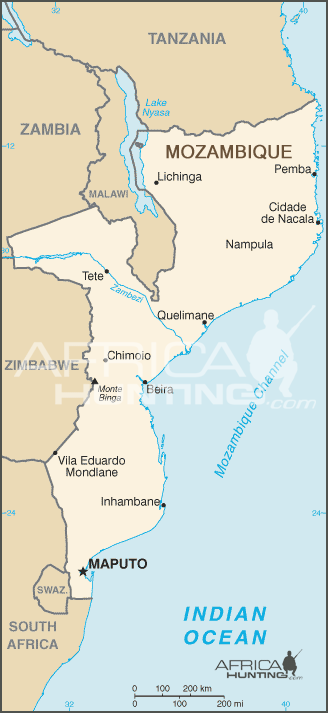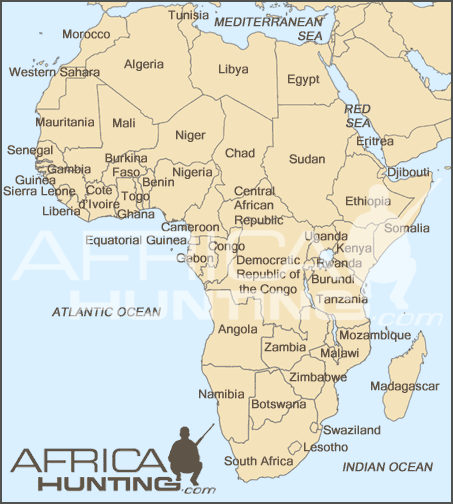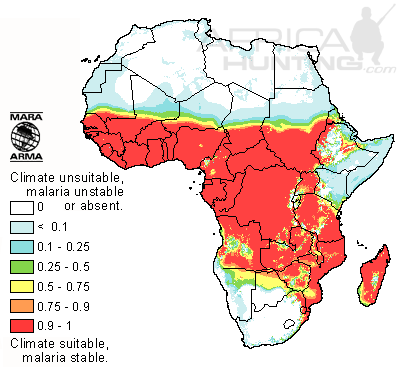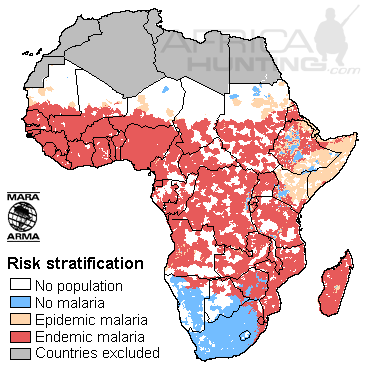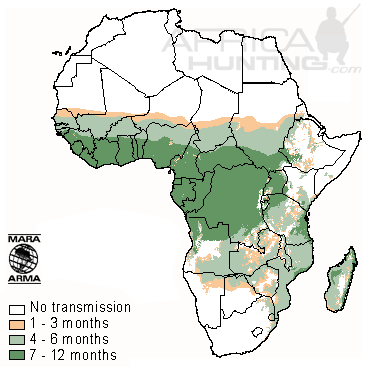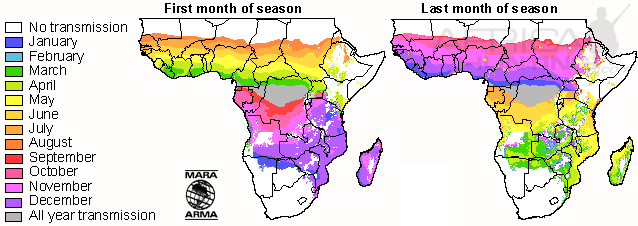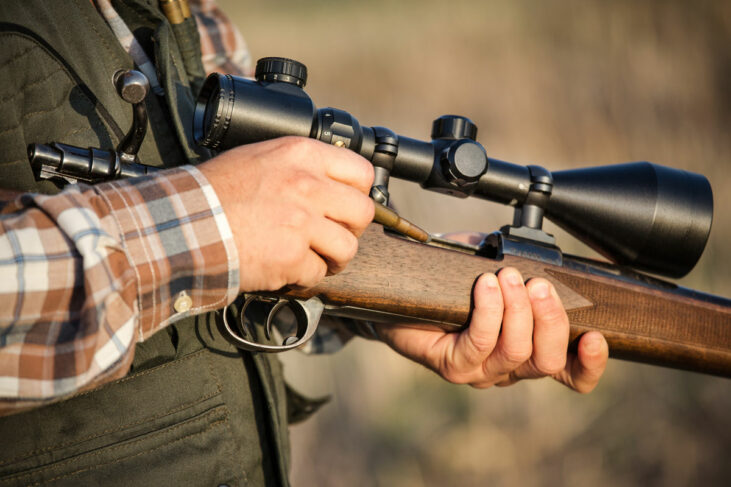- Joined
- Oct 1, 2007
- Messages
- 13,612
- Reaction score
- 9,994
- Website
- www.africahunting.com
- Media
- 5,597
- Articles
- 321
If you notice that anything in this article needs to be updated or anything is incorrect or incomplete please help us keep it current by letting us know.
MOZAMBIQUE Hunting Information

 Hunting Mozambique
Hunting Mozambique
It's been 500 years since the first Europeans arrived in Mozambique. In 1498, six years after the discovery of America, the Portuguese landed in Mozambique and remained there for the ensuing half-millennium until granting Mozambique its independence in 1975. For two decades following independence this poor country experienced an often brutal civil war between two rival factions, one supported by Western interests, the other by Communist interests. Since the end of that war in 1992, Mozambique has been striving to once again become the great hunting destination it once was.

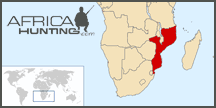
Mozambique is located on the Indian Ocean, and faces the island of Madagascar. It is bordered by Tanzania, Malawi, Zambia, Zimbabwe, South Africa and Swaziland. In Mozambique the hunting areas comprise a large portion of the entire country. One of the hunting regions found near Beira (pronounced bay-ra), the second largest city, located in central Mozambique. The other hunting areas are found to the north and west, toward Tanzania and Zimbabwe, near the borders of these neighboring countries.
The hunting areas near Beira were those most hard hit by the civil war and today bear the scars of the turmoil. Poaching was particularly rampant in this region during the war and the animal populations suffered enormously. In these areas, animal densities are very uneven, especially in comparison with most other African countries. The habitat consists of green savannah, forest glades and dense forests in which hunting is very difficult.
The best hunting in Mozambique is found in the more remote areas, especially in the north near Tanzania and in the west, not far from Zimbabwe. These major hunting countries and the neighboring reserves or parks, such as Nyasa, ensure larger animal populations and diversity for Mozambique. Shrub savannah, dry savannah and dense forests form the habitat of these zones.
The wildlife in Mozambique includes a variety of species, of which antelope are the most numerous both in number and variety. Often regarded as the most beautiful of the antelope, the Sable Antelope (Hippotragus Niger) is found in virtually all hunting areas. There is also Nyala (Tragelaphus Angasi), Cape Eland (Taurotragus Oryx) and Greater Kudu (Tragelaphus Strepsiceros). Other species of antelope include Lichtenstein Hartebeest (Alclaphus Lichtensteini), Chobe Bushbuck (Tragelaphus Scriptus Ornatus), Southern Reedbuck (Redunca Arundinum), Common Waterbuck (Kobus Ellipsiprymnus), Common Duiker (Cephalophus Grimmia), Red Duiker (Cephalophus Rufilatus), Oribi (Ourebia Ourebi), Suni (Neotragus Moschatus), Warthog (Phacochoerus Aethiopicus) and Bushpig (Potamochoerus).
Crocodiles are also a hunted in Mozambique. They are abundant and often quite large. The main areas for Crocodile hunting are located on the Zambezi River and Lake Gahora Bassa. These areas are also good for Hippopotamus hunting. Hunting Elephant is legal in Mozambique. Elephants are normally abundant in the north and west of Mozambique, particularly in the areas bordering on Tanzania and Zimbabwe.
Lion hunting is done by calling or tracking and not by baiting unlike most countries in Eastern and Southern Africa. Leopards are also abundant in many areas in the North and West. Cape Buffalo (Syncerus Caffer Caffer) are found in all hunting areas, but their numbers vary in different areas. In the regions near Beira, Buffalo have been poached excessively and are difficult to find.
Hunting areas in Mozambique are open territories, not fenced. The average area is approximately 150,000 acres. Hunting in Mozambique begins in a 4x4 vehicle from the camps, then once in the bush, tracking on foot but sometimes done by tracking directly from the camps. In most areas the terrain is flat and the hunting is not very physically demanding. The hunting areas are rented and managed by the hunting outfitters who are usually French, white Zimbabwean, South African or less frequently Portuguese professional hunters.
The hunting areas near Beira are accessible only by road from Beira and the drive is on average 3 to 6 hours depending on the location of the area and road conditions. Hunting in the northern and western areas is accessible by plane and then by car starting from Maputo, the Mozambican capital, or from Beira. In Mozambique the hunting camps are permanent fixtures. The bungalows are comfortable and the food is good with plenty to eat.
The hunting season runs from May through end of September.
 Finding a Hunting Outfitter in Mozambique
Finding a Hunting Outfitter in Mozambique
The single most important thing you need to do to ensure that you are booking with a good hunting outfitter is check their references. The outfitter should provide you with more than a few references, especially clients who have hunted with them within the last year and you should call many of them.
Click here to check out our Mozambique Hunting Reports, a section where you can find or post more detailed Hunting Reports. Or visit our forums where you can interact with other hunters and industry professionals, post questions or read what others are discussing about hunting in Mozambique by clicking here.
We are all empowered by learning from each other and we encourage you to make educated decisions based upon honest information and real experience.


Mozambique Hunting Areas Map and Satellite Imagery
Click here for Mozambique hunting areas map, country and satellite imagery maps.
 Climate in Mozambique
Climate in Mozambique
The climate varies in the different regions of the country, but generally the inland areas are slightly cooler, although more humid than along the coast in the rainy season. Winter is the dry season lasting from April to September, and is the best time to visit the country. The southern parts of the country are generally drier and less tropical than the north, with temperatures along the coast averaging 80D F (27D C). The rainy season coincides with the heat and humidity from October to March, with average coastal temperatures of 88D F (31D C).
Two main seasons, one wet and one dry, divide the climatic year. The wet season, from November through March, has monthly averages between 27D - 29D C (81 - 84D F), with cooler temperatures in the interior uplands. The dry season lasts from April to October and has June and July temperatures averaging 18D - 20D C (64 - 68D F). The average annual rainfall is greatest (about 142 cm / 56 in) over the western hills and the central areas, and lowest (30 cm / 12 in) in the southwest.
Weather Underground provides a very detailed look at current weather conditions, weather forecasts, a history and almanac for predicting average weather conditions during the time while you will be traveling in that part of the world. Click here for Mozambique's climate and temperature forecast.
 Mozambique Hunting Season & When Hunting is Allowed
Mozambique Hunting Season & When Hunting is Allowed
- Hunting Season - May 1st to September 30th
- There is no regulation controlling the number of days of a hunting safaris, if a minimum, it is set it is by the safari company.
- There is no regulation controlling the number of species a client may take during a hunting safaris, if a minimum, it is set it is by the safari company.
- The safari company controls the minimum number of days for a hunting safari based upon certain species being hunted. The safari company imposes their own guidelines as to the minimum number of days required to hunt certain species or combination of species.
- Trophy hunting may take place within the hours of daylight during the hunting season.
- Hunting is allowed at night with artificial light but only for the following species Lion, Leopard, Crocodile and Bushpig.
- Hunting of female, young and/or immature animals is prohibited.
- All animals are subject to quota availability.
- Hunting from a vehicle is not permitted, though the vehicle can be used to reach the area from where hunting on foot can begin.
- Shooting an animal from a vehicle is not permitted, a person actually needs to be 200 yards (183 meters) away from a vehicle to shoot an animal with the exception of hunting Crocodile from a boat.
- Bowhunting is permitted.
Mozambique defines two categories of land where hunting is permitted; hunting concessions known also as coutadas and game ranches.
You will find information about the bird hunting season in Mozambique near the bottom of this page.
 Species to Hunt in Mozambique
Species to Hunt in Mozambique
Mozambique offers a wide variety of species for trophy hunting, including Elephant, Cape Buffalo, Lion, Leopard and Hippopotamus in addition to many other species.
Click here to visit AfricaHunting.com complete list of species available to hunt in Mozambique.
As a member of the Convention on International Trade in Endangered Species (CITES) Mozambique has a CITES quota for Elephants as well as for Leopard. Leopard trophies can be brought back into the United States, however note that the U.S. Fish & Wildlife Service does not recognize the Elephant quota granted by CITES and it will not permit the importation of Elephant trophies from Mozambique into the United States.

Shot Placement Guide for the Perfect Shot
Click here to visit our shot placement guide, the most comprehensive shot placement guide of African game online.
 Bowhunting in Mozambique
Bowhunting in Mozambique
Bowhunting in Mozambique is legal during the hunting season and this for many years. Bowhunting is unrestricted and all species may be taken with a bow. This country offers tremendous opportunities for bow hunters however few operators have the experience to conduct bowhunting safaris so careful selection of the hunting outfitter is important.
Mozambique does not have an additional bow qualification for professional hunters.
 Importation of Bows & Arrows into Mozambique
Importation of Bows & Arrows into Mozambique
It is legal for hunters to import bows for bowhunting purposes into Mozambique and no import permit is required.
 Minimum Equipment Requirements for Bowhunting in Mozambique
Minimum Equipment Requirements for Bowhunting in Mozambique
Mozambique does not have any minimum equipment requirements for bowhunting so common sense will apply or here below find the requirements for South Africa.
- Big Game
Bow Kinetic Energy 80 ft/lbs
Arrow Weight 700 grain
(Elephant, Rhino, Hippo, Buffalo)
- Medium Game
Bow Kinetic Energy 70 ft/lbs
Arrow Weight 550 grain
(Kudu, Eland, Oryx / Gemsbok, Hartebeest, Wildebeest, Zebra, Giraffe, Sable Antelope, Roan Antelope, Waterbuck, Tsessebe, etc.)
- Small Game
Bow Kinetic Energy 40 ft/lbs
Arrow Weight 400 grain
(Warthog, Nyala, Springbok, Impala, Blesbok, Duiker, Steenbok, Ostrich, Caracal, Black-Backed Jackal, Game Birds, etc.)
 Minimum Equipment Requirements for Rifle Hunting in Mozambique
Minimum Equipment Requirements for Rifle Hunting in Mozambique
- There is no minimum equipment requirement for rifle hunting in Mozambique.
- Mozambique does not require a minimum energy (Eo - muzzle velocity) for calibers used.
 Traveling with Firearms & Ammunition
Traveling with Firearms & Ammunition
Traveling to Africa usually requires taking at least a couple of different airlines as well as departing from several countries whose laws and regulations are constantly changing. And they all have their own rules, regulations and laws for which it is your responsibility to be aware and in compliance with all of them. For this reason you should read the Africa Hunting article on Laws & Regulations for Hunters Traveling with Weapons by clicking here.
 Permits & Importation of Firearms & Ammunition into Mozambique
Permits & Importation of Firearms & Ammunition into Mozambique
The following section contains the basic information you will need to know, for more detailed information you should read Africa Hunting article on Importation or Transiting Procedures Through Countries with Weapons by clicking here, especially if you are transiting through or traveling to another country.
- Temporary importation of firearms and ammunition into Mozambique is NOT free of charge, please check with your outfitter or the as to the current charges, as they are based upon number of rifles, days of hunt and type of hunting safari. The process is usually quick and easy.
- Your hunting outfitter will send you a form to fill out and return to them so they can arrange for your firearms and ammunition temporary import/export permits months prior to your arrival as required by the government of Mozambique, specifically the Ministry of Interior. This permit will be based upon the firearm information you provide to your outfitter so it is very important that you carefully consider which firearms you will be bringing with you, as once you have submitted the form you will not be able to change your mind. It is very important that all weapons serial numbers be exactly the same when you arrive as what was issued on your import/export permit. Last minute changes of mind cause more problems regarding gun permits than any other reason. Exact number of ammunition is also important.
- Once the temporary importation of firearms and ammunition has been granted, the hunting outfitter will apply for a tax exemption with custom officials based on your port of entry so you do not have to pay import duties upon entry into Mozambique.
- There is a limit of four firearms per hunter that may be imported into Mozambique for trophy hunting purposes. However if traveling through South Africa a maximum of two firearms are allowed even if you are just in transit. Some European countries also have greater limitation than Botswana as to the number of firearms which can be brought into their country even while in transit. You should read the Africa Hunting article on Importation or Transiting Procedures Through Countries with Weapons by clicking here.
- A maximum of forty (40) rounds of ammunition may be imported per hunting rifle, two hundred (200) shells of ammunition per shotgun and fifty (50) rounds of ammunition per handgun, however you may encounter greater restrictions from the airline(s) you are traveling on or country you are departing from or other countries you may be visiting or transiting through. For more information on this topic, read the Africa Hunting article, Laws & Regulations for Hunters Traveling with Weapons by clicking here. Importation of ammunition into Botswana is subject to a 10% Government Value Added Tax (VAT) so make sure to bring only what is necessary for your hunting safari.
- Only ammunition for the specific caliber(s) you are bringing may be imported.
- No automatic, semi-automatic firearms are allowed. Semi-automatic shotguns are allowed.
- No weapons which fall under military categories such as .308 Winchester (7.62x51mm NATO), please check with your outfitter if you have a questionable caliber.
- Handguns are allowed for hunting purposes. A special permit which the safari operator must apply for prior to the start of the hunt can be requested with the Ministry of Interior. This special handgun permit comes at a cost.

Need help traveling to or through South Africa with your guns?
South Africa is the number one hunting destination in Africa and most safari hunters will at least transit through South Africa even if they are not staying in the country to hunt. That's why the services of riflepermits.com are so valuable. They can help you navigate the stressful and cumbersome process of transiting or importing your guns into South Africa making it easy and less time consuming.
riflepermits.com work hand in hand-in-hand with the South African Police Services (SAPS) to provide import/export or in-transit permits for your firearms before you even arrive in South Africa. They will hand deliver your pre-authorized permit to you on arrival and also guide you through the procedure at the SAPS Permit Office making it as hassle free as possible.
They also have rifle storage facilities for those who just want to do a bit of traveling or sight seeing in South Africa as well. They can help make your hunting safari a great experience from start to finish!
For more information visit their website!

Henry Durrheim
riflepermits.com - QUICK & EASY arrival with your firearm in South Africa! We'll meet you and escort you through it...
henry@riflepermits.com
www.riflepermits.com
 Mozambique Professional Hunters Association
Mozambique Professional Hunters Association
There is no Professional Hunters Association in Mozambique.
Mozambican Safari Operators (AMOS)
Mozambican Safari Operators (AMOS). AMOS currently has no web site for more information regarding basic hunting laws and regulations and more. For more information, contact Adamo Valy at:
Maputo, Mozambique
adamov@hollard.co.mz
 Mozambique Hunting Permits & Licenses
Mozambique Hunting Permits & Licenses
The wildlife department and the government of Mozambique allocates quotas by species to each hunting concessions known also as coutadas and game ranches on an individual basis.
Your hunting license and permit will be applied for and obtained by your hunting outfitter well prior to your arrival, please check with your outfitter as to the current charges or if the cost of this paperwork is already included in the price of your hunt.
The following is required regarding permits for trophy hunting in Mozambique:
- There is no regulation controlling the number of days of a hunting safaris, if a minimum, it is set it is by the safari company.
- There is no regulation controlling the number of species a client may take during a hunting safaris, if a minimum, it is set it is by the safari company.
- The safari company controls the minimum number of days for a hunting safari based upon certain species being hunted. The safari company imposes their own guidelines as to the minimum number of days required to hunt certain species or combination of species.
- Clients are only permitted to hunt animals for which a license is issued.
- All animals are subject to quota availability.
- Permits must be issued prior to the hunt commencing.
- A separate permit must be issued for each individual hunting client.
- A licensed and registered professional hunter in Mozambique must conduct all hunting.
- The hunting licenses must be in possession of the hunting party at all time while hunting.
- Problem Animal Control hunts, also known as PAC hunts, in Mozambique are prohibited.
- Clients are expected to abide by all Wildlife Hunting Regulations in Mozambique.


CITIES Permits & U.S. Fish & Wildlife Service
The importation of some individual sport hunted trophies requires a CITES permit (i.e. African Elephant, White Rhinoceros and Leopard to name a few), you will need to submit an application to the U.S. Fish & Wildlife Service if you are planning to import any of the species on their list. You can download the CITIES permit application forms by clicking here. CITES stands for Convention on International Trade in Endangered Species of Wild Fauna and Flora, visit their web site at www.cites.org.

Shipping & Importing Your Hunting Trophies Back
I highly recommend that when it come to the intricacies of importing your hunting trophies do yourself a favor and hire experts to facilitate the process. Allan Zarach from TROPHY SHIPPERS (www.trophyshippers.com) offers an incredible service at a great price.
TROPHY SHIPPERS is a family owned company and have been in business since 1981. They are a customs brokerage and freight forwarding company that is dedicated to helping hunters quickly and efficiently get their hunting trophies home. They know what your hunting trophies mean to you, because they are a family of hunters themselves. If you have trophies that you need brought back to the United States or are planning a trip to Africa to hunt or anywhere in the world, let TROPHY SHIPPERS handle all of the paperwork, clearances, and shipments for you!
They truly provide an invaluable full service for managing an increasingly more detailed and complex process for the importation of your trophies from start to finish. If you would like to contact them, TROPHY SHIPPERS can be reached at Cell/WhatsApp +1 (847) 927-0101 / Office +1 (630) 595-7300, or via their website www.trophyshippers.com, click here.

 The Safari Planning Guide
The Safari Planning Guide
Click here to visit the Africa Hunting Safari Planning Guide, or click the direct links below to visit the individual articles in this section with many useful resources to help you plan and prepare for your African hunting safari:
- Hunting Safari Preparation Timeline
- Safari Planning Resource Guide
- Why You Should Always Use A Hunting Travel Agent!
- Travel, Medical & Evacuation Insurance
- Why You Should Use A Hunting Trophy Shipping & Importation Specialist!
- What You Need to Know About Packing
- Clothing & Footwear List
- Personal Items & Toiletries List
- Hunting Gear List for Rifle Hunters
- Hunting Gear List for Bow Hunters
- Travel Documents & Money
- Tipping Guide
 Camouflage
Camouflage
Camouflage clothing is allowed in Mozambique during the actual hunt. I would advise that it only be worn during the hunt and not in town or for travel.
 How to Get There
How to Get There
A majority of international hunting clients will fly directly from their country of origin into South Africa on a major international airline, many of which offer a route to Johannesburg (Tambo International Airport - JNB). This route then require a short flight to get to Mozambique's capital Maputo.

Travel Agent Specializing in Hunting Clientele
You may wish to consider using a travel agent that specializes in hunting worldwide or in Africa as they may be familiar with these routes and used to working with these airlines. Specialty travel agents can often get better deals than you can find on major websites or through regular travel agents. I highly recommend TRAVEL EXPRESS, hunting travel specialists, they are the company that I personally use. Jennifer Ginn can help you, she is very knowledgeable and a hunter herself. She can assist you with all aspects of your hunting travel planning from airfare, lodging and car rentals to entry visa's, firearm permits, etc... Click here to visit TRAVEL EXPRESS website www.TravelExpressAgency.com.
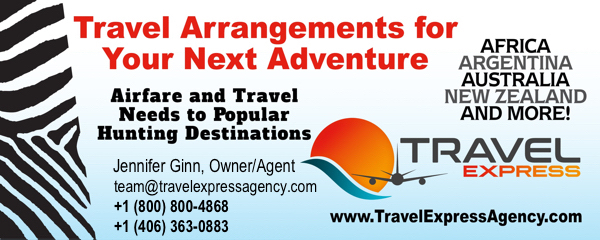
 International Airport in Mozambique
International Airport in Mozambique
- City: Maputo - capital of Mozambique
Maputo International Airport
Airport Code MPM
Located 2 miles (3 km) northwest of the city center of Maputo
 Major Airlines Flying into Mozambique
Major Airlines Flying into Mozambique

LAM Airlines
www.lam.co.mz

South African Airways
www.flysaa.com

Delta Airlines
www.delta.com

Lufthansa (Germany)
www.lufthansa.com
 Travel Information
Travel Information
Click here to view the Africa Hunting travel information section, or the direct links below, with many useful articles and resources to help you plan your travel for your African hunting safari, including:
- Importation or Transiting Procedures Through Countries with Weapons
- Laws & Regulations for Hunters Traveling with Weapons
- Airports & Airlines
- Value Added Tax (VAT) Refunds
- Embassies & Consulates
 Visa & Travel Documents
Visa & Travel Documents
All foreigners must be in possession of a passport that will remain valid for at least six months after the intended date of departure from Mozambique as well as a round trip airline ticket.
To find out if you need to apply for a Visa in advance, a great resource with free information is Travel Document System (TDS) at www.traveldocs.com. If you are in need of a visa, Travel Document System is nationally recognized as a leading authority in the field of international Travel Documents. Travelers are quite often not sure of the specific requirements or documentation required to enter into a foreign country. TDS helps international travelers easily understand what is specifically required of them in order to gain passage into another country and provides visa services for U.S. citizens to most countries for which an entry visa is required www.traveldocs.com.
 Traveler's Health & ImmunizationsNo vaccinations or International Health Certificate are required to enter Mozambique, however we suggest that you visit the Center for Disease Control & Prevention (CDC) for their recommendations for travel in Mozambique.
Traveler's Health & ImmunizationsNo vaccinations or International Health Certificate are required to enter Mozambique, however we suggest that you visit the Center for Disease Control & Prevention (CDC) for their recommendations for travel in Mozambique.
CDC recommends that you see a health-care provider who specializes in Travel Medicine. Find a travel medicine clinic near you by clicking here. If you have a medical condition, you should also share your travel plans with any doctors you are currently seeing for other medical reasons.
Recommended Vaccinations Include:
- Hepatitis A
- Hepatitis B
- Typhoid
- Rabies
- Routine vaccination if you are not up-to-date including Influenza, Polio, MMR (measles/mumps/rubella) and DPT (diphtheria/pertussis/tetanus)
Malaria prophylactics medication is highly recommended and should be considered as mandatory, however we suggest that you visit the Center for Disease Control & Prevention (CDC) for their recommendations for travel in Mozambique as mosquitoes in this country are resistant to some antimalarial drugs.
The CDC is most credible online resource for up to date health information. Click here to visit the section dedicated to Traveler's Health specific to Mozambique. Information about vaccinations, diseases, prevention, tips and much more can be found here.

Malaria Map of Mozambique
Click here to enlarge Mozambique malaria map.

Malaria Maps of Africa
Click here for Africa malaria maps, distribution model, endemic / epidemic risk areas, duration of malaria transmission season and duration of malaria transmission season.

Emergency Evacuation and Field Rescue Membership
No matter if it's your first or fifth time hunting in Africa, unavoidable accidents do happen. Whether a medical or security emergency, an evacuation from a remote part of Mozambique could cost well over $100,000. I strongly recommend that anyone traveling to Mozambique purchase a membership with Global Rescue, the only crisis response company that provides hunters with medical and security evacuation and consultation services anywhere in the world, even the most remote areas. Their deployable teams of paramedics and special operations veterans, backed by on-staff physicians and the specialists at Johns Hopkins Medicine, will get to you wherever you are, by any means necessary, and evacuate you all the way to your home country hospital of choice.
Member benefits include:
- 24hr medical advisory services from critical care paramedics and in-house physicians
- Specialists at Johns Hopkins Medicine available in real-time
- Field Rescue from the point of illness or injury
- Evacuation back to the member's home hospital of choice
- Global network of medical Centers Of Excellence
- Deployable medical and security teams
- Evacuation services provided up to $500,000
Memberships start at $139
If you would like to purchase a membership or have additional questions, Global Rescue can be reached anytime at +1 (617) 459-4200, or via www.globalrescue.com, click here.

Travel Advisory from The U.S. Department of State, Bureau of Consular Affairs
What you should know before you go. You may obtain international travel information by country, warnings for travelers about crime and public announcements about travel abroad in addition to so much other valuable information http://travel.state.gov.
 Embassies & Consulates
Embassies & Consulates
Mozambique Embassy in the USAwww.embamoc-usa.org
Click here for a complete searchable database of all embassies and consulates from every country in the world including Mozambique.
 Bird Hunting Season in Mozambique
Bird Hunting Season in Mozambique
No official game bird hunting in Mozambique.
 Tourism in Mozambique
Tourism in Mozambique
The Mozambique Official Government Tourism web site (Guia Turistico de Mozambique) is a good place to explore what options are available for travel outside of your hunting safari, www.turismomocambique.co.mz. Your hunting safari outfitter may also offer short excursions up to extensive touring through their company as well.
 General Information about Mozambique
General Information about Mozambique
- Republic of Mozambique (Republica de Mocambique)
- Population 21,400,000
- Capital City Maputo (1,300,000)
- Languages Portuguese (official), Emakhuwa, Xichangana, Elomwe, Cisena, Echuwabo and numerous tribal dialects.
- Official Currency Mozambican Metical (MZN). Denominations in 100,000, 50,000, 20,000, 10,000, 5,000, 1,000, 500, 200, 100, 50, 20, 10, 5 and 1 Mozambican Metical bank notes. To view images of these banknotes, click here.
- Electricity, the Botswanan standard is 220/240 volts, two-pin 15 amp outlets. Most lodges/camps have generator(s) to power the electricity through rechargeable batteries therefore it is recommended to bring a small power inverter that plugs into a cigarette lighter to invert 12V DC Power to 110V AC for recharging in the hunting vehicle. Generator(s) in most camps are only run during the morning and evening hours and sometimes can be run at other times by special request. Be sure to check with your hunting outfitter in Mozambique what they are using. Click here for more info.
- Country Dialing Code 258
Click here for more information about Mozambique from the CIA World Factbook which supplies a multitude of facts about Mozambique.
 Official Government Web Site Of Mozambique - Portal do Governo de Mo髴? ァbique
Official Government Web Site Of Mozambique - Portal do Governo de Mo髴? ァbique
www.portaldogoverno.gov.mz
MOZAMBIQUE Hunting Information

It's been 500 years since the first Europeans arrived in Mozambique. In 1498, six years after the discovery of America, the Portuguese landed in Mozambique and remained there for the ensuing half-millennium until granting Mozambique its independence in 1975. For two decades following independence this poor country experienced an often brutal civil war between two rival factions, one supported by Western interests, the other by Communist interests. Since the end of that war in 1992, Mozambique has been striving to once again become the great hunting destination it once was.


Mozambique is located on the Indian Ocean, and faces the island of Madagascar. It is bordered by Tanzania, Malawi, Zambia, Zimbabwe, South Africa and Swaziland. In Mozambique the hunting areas comprise a large portion of the entire country. One of the hunting regions found near Beira (pronounced bay-ra), the second largest city, located in central Mozambique. The other hunting areas are found to the north and west, toward Tanzania and Zimbabwe, near the borders of these neighboring countries.
The hunting areas near Beira were those most hard hit by the civil war and today bear the scars of the turmoil. Poaching was particularly rampant in this region during the war and the animal populations suffered enormously. In these areas, animal densities are very uneven, especially in comparison with most other African countries. The habitat consists of green savannah, forest glades and dense forests in which hunting is very difficult.
The best hunting in Mozambique is found in the more remote areas, especially in the north near Tanzania and in the west, not far from Zimbabwe. These major hunting countries and the neighboring reserves or parks, such as Nyasa, ensure larger animal populations and diversity for Mozambique. Shrub savannah, dry savannah and dense forests form the habitat of these zones.
The wildlife in Mozambique includes a variety of species, of which antelope are the most numerous both in number and variety. Often regarded as the most beautiful of the antelope, the Sable Antelope (Hippotragus Niger) is found in virtually all hunting areas. There is also Nyala (Tragelaphus Angasi), Cape Eland (Taurotragus Oryx) and Greater Kudu (Tragelaphus Strepsiceros). Other species of antelope include Lichtenstein Hartebeest (Alclaphus Lichtensteini), Chobe Bushbuck (Tragelaphus Scriptus Ornatus), Southern Reedbuck (Redunca Arundinum), Common Waterbuck (Kobus Ellipsiprymnus), Common Duiker (Cephalophus Grimmia), Red Duiker (Cephalophus Rufilatus), Oribi (Ourebia Ourebi), Suni (Neotragus Moschatus), Warthog (Phacochoerus Aethiopicus) and Bushpig (Potamochoerus).
Crocodiles are also a hunted in Mozambique. They are abundant and often quite large. The main areas for Crocodile hunting are located on the Zambezi River and Lake Gahora Bassa. These areas are also good for Hippopotamus hunting. Hunting Elephant is legal in Mozambique. Elephants are normally abundant in the north and west of Mozambique, particularly in the areas bordering on Tanzania and Zimbabwe.
Lion hunting is done by calling or tracking and not by baiting unlike most countries in Eastern and Southern Africa. Leopards are also abundant in many areas in the North and West. Cape Buffalo (Syncerus Caffer Caffer) are found in all hunting areas, but their numbers vary in different areas. In the regions near Beira, Buffalo have been poached excessively and are difficult to find.
Hunting areas in Mozambique are open territories, not fenced. The average area is approximately 150,000 acres. Hunting in Mozambique begins in a 4x4 vehicle from the camps, then once in the bush, tracking on foot but sometimes done by tracking directly from the camps. In most areas the terrain is flat and the hunting is not very physically demanding. The hunting areas are rented and managed by the hunting outfitters who are usually French, white Zimbabwean, South African or less frequently Portuguese professional hunters.
The hunting areas near Beira are accessible only by road from Beira and the drive is on average 3 to 6 hours depending on the location of the area and road conditions. Hunting in the northern and western areas is accessible by plane and then by car starting from Maputo, the Mozambican capital, or from Beira. In Mozambique the hunting camps are permanent fixtures. The bungalows are comfortable and the food is good with plenty to eat.
The hunting season runs from May through end of September.

The single most important thing you need to do to ensure that you are booking with a good hunting outfitter is check their references. The outfitter should provide you with more than a few references, especially clients who have hunted with them within the last year and you should call many of them.
Click here to check out our Mozambique Hunting Reports, a section where you can find or post more detailed Hunting Reports. Or visit our forums where you can interact with other hunters and industry professionals, post questions or read what others are discussing about hunting in Mozambique by clicking here.
We are all empowered by learning from each other and we encourage you to make educated decisions based upon honest information and real experience.


Mozambique Hunting Areas Map and Satellite Imagery
Click here for Mozambique hunting areas map, country and satellite imagery maps.

The climate varies in the different regions of the country, but generally the inland areas are slightly cooler, although more humid than along the coast in the rainy season. Winter is the dry season lasting from April to September, and is the best time to visit the country. The southern parts of the country are generally drier and less tropical than the north, with temperatures along the coast averaging 80D F (27D C). The rainy season coincides with the heat and humidity from October to March, with average coastal temperatures of 88D F (31D C).
Two main seasons, one wet and one dry, divide the climatic year. The wet season, from November through March, has monthly averages between 27D - 29D C (81 - 84D F), with cooler temperatures in the interior uplands. The dry season lasts from April to October and has June and July temperatures averaging 18D - 20D C (64 - 68D F). The average annual rainfall is greatest (about 142 cm / 56 in) over the western hills and the central areas, and lowest (30 cm / 12 in) in the southwest.
Weather Underground provides a very detailed look at current weather conditions, weather forecasts, a history and almanac for predicting average weather conditions during the time while you will be traveling in that part of the world. Click here for Mozambique's climate and temperature forecast.

- Hunting Season - May 1st to September 30th
- There is no regulation controlling the number of days of a hunting safaris, if a minimum, it is set it is by the safari company.
- There is no regulation controlling the number of species a client may take during a hunting safaris, if a minimum, it is set it is by the safari company.
- The safari company controls the minimum number of days for a hunting safari based upon certain species being hunted. The safari company imposes their own guidelines as to the minimum number of days required to hunt certain species or combination of species.
- Trophy hunting may take place within the hours of daylight during the hunting season.
- Hunting is allowed at night with artificial light but only for the following species Lion, Leopard, Crocodile and Bushpig.
- Hunting of female, young and/or immature animals is prohibited.
- All animals are subject to quota availability.
- Hunting from a vehicle is not permitted, though the vehicle can be used to reach the area from where hunting on foot can begin.
- Shooting an animal from a vehicle is not permitted, a person actually needs to be 200 yards (183 meters) away from a vehicle to shoot an animal with the exception of hunting Crocodile from a boat.
- Bowhunting is permitted.
Mozambique defines two categories of land where hunting is permitted; hunting concessions known also as coutadas and game ranches.
You will find information about the bird hunting season in Mozambique near the bottom of this page.

Mozambique offers a wide variety of species for trophy hunting, including Elephant, Cape Buffalo, Lion, Leopard and Hippopotamus in addition to many other species.
Click here to visit AfricaHunting.com complete list of species available to hunt in Mozambique.
As a member of the Convention on International Trade in Endangered Species (CITES) Mozambique has a CITES quota for Elephants as well as for Leopard. Leopard trophies can be brought back into the United States, however note that the U.S. Fish & Wildlife Service does not recognize the Elephant quota granted by CITES and it will not permit the importation of Elephant trophies from Mozambique into the United States.

Shot Placement Guide for the Perfect Shot
Click here to visit our shot placement guide, the most comprehensive shot placement guide of African game online.

Bowhunting in Mozambique is legal during the hunting season and this for many years. Bowhunting is unrestricted and all species may be taken with a bow. This country offers tremendous opportunities for bow hunters however few operators have the experience to conduct bowhunting safaris so careful selection of the hunting outfitter is important.
Mozambique does not have an additional bow qualification for professional hunters.

It is legal for hunters to import bows for bowhunting purposes into Mozambique and no import permit is required.

Mozambique does not have any minimum equipment requirements for bowhunting so common sense will apply or here below find the requirements for South Africa.
- Big Game
Bow Kinetic Energy 80 ft/lbs
Arrow Weight 700 grain
(Elephant, Rhino, Hippo, Buffalo)
- Medium Game
Bow Kinetic Energy 70 ft/lbs
Arrow Weight 550 grain
(Kudu, Eland, Oryx / Gemsbok, Hartebeest, Wildebeest, Zebra, Giraffe, Sable Antelope, Roan Antelope, Waterbuck, Tsessebe, etc.)
- Small Game
Bow Kinetic Energy 40 ft/lbs
Arrow Weight 400 grain
(Warthog, Nyala, Springbok, Impala, Blesbok, Duiker, Steenbok, Ostrich, Caracal, Black-Backed Jackal, Game Birds, etc.)

- There is no minimum equipment requirement for rifle hunting in Mozambique.
- Mozambique does not require a minimum energy (Eo - muzzle velocity) for calibers used.

Traveling to Africa usually requires taking at least a couple of different airlines as well as departing from several countries whose laws and regulations are constantly changing. And they all have their own rules, regulations and laws for which it is your responsibility to be aware and in compliance with all of them. For this reason you should read the Africa Hunting article on Laws & Regulations for Hunters Traveling with Weapons by clicking here.

The following section contains the basic information you will need to know, for more detailed information you should read Africa Hunting article on Importation or Transiting Procedures Through Countries with Weapons by clicking here, especially if you are transiting through or traveling to another country.
- Temporary importation of firearms and ammunition into Mozambique is NOT free of charge, please check with your outfitter or the as to the current charges, as they are based upon number of rifles, days of hunt and type of hunting safari. The process is usually quick and easy.
- Your hunting outfitter will send you a form to fill out and return to them so they can arrange for your firearms and ammunition temporary import/export permits months prior to your arrival as required by the government of Mozambique, specifically the Ministry of Interior. This permit will be based upon the firearm information you provide to your outfitter so it is very important that you carefully consider which firearms you will be bringing with you, as once you have submitted the form you will not be able to change your mind. It is very important that all weapons serial numbers be exactly the same when you arrive as what was issued on your import/export permit. Last minute changes of mind cause more problems regarding gun permits than any other reason. Exact number of ammunition is also important.
- Once the temporary importation of firearms and ammunition has been granted, the hunting outfitter will apply for a tax exemption with custom officials based on your port of entry so you do not have to pay import duties upon entry into Mozambique.
- There is a limit of four firearms per hunter that may be imported into Mozambique for trophy hunting purposes. However if traveling through South Africa a maximum of two firearms are allowed even if you are just in transit. Some European countries also have greater limitation than Botswana as to the number of firearms which can be brought into their country even while in transit. You should read the Africa Hunting article on Importation or Transiting Procedures Through Countries with Weapons by clicking here.
- A maximum of forty (40) rounds of ammunition may be imported per hunting rifle, two hundred (200) shells of ammunition per shotgun and fifty (50) rounds of ammunition per handgun, however you may encounter greater restrictions from the airline(s) you are traveling on or country you are departing from or other countries you may be visiting or transiting through. For more information on this topic, read the Africa Hunting article, Laws & Regulations for Hunters Traveling with Weapons by clicking here. Importation of ammunition into Botswana is subject to a 10% Government Value Added Tax (VAT) so make sure to bring only what is necessary for your hunting safari.
- Only ammunition for the specific caliber(s) you are bringing may be imported.
- No automatic, semi-automatic firearms are allowed. Semi-automatic shotguns are allowed.
- No weapons which fall under military categories such as .308 Winchester (7.62x51mm NATO), please check with your outfitter if you have a questionable caliber.
- Handguns are allowed for hunting purposes. A special permit which the safari operator must apply for prior to the start of the hunt can be requested with the Ministry of Interior. This special handgun permit comes at a cost.

Need help traveling to or through South Africa with your guns?
South Africa is the number one hunting destination in Africa and most safari hunters will at least transit through South Africa even if they are not staying in the country to hunt. That's why the services of riflepermits.com are so valuable. They can help you navigate the stressful and cumbersome process of transiting or importing your guns into South Africa making it easy and less time consuming.
riflepermits.com work hand in hand-in-hand with the South African Police Services (SAPS) to provide import/export or in-transit permits for your firearms before you even arrive in South Africa. They will hand deliver your pre-authorized permit to you on arrival and also guide you through the procedure at the SAPS Permit Office making it as hassle free as possible.
They also have rifle storage facilities for those who just want to do a bit of traveling or sight seeing in South Africa as well. They can help make your hunting safari a great experience from start to finish!
For more information visit their website!

Henry Durrheim
riflepermits.com - QUICK & EASY arrival with your firearm in South Africa! We'll meet you and escort you through it...
henry@riflepermits.com
www.riflepermits.com

There is no Professional Hunters Association in Mozambique.
Mozambican Safari Operators (AMOS)
Mozambican Safari Operators (AMOS). AMOS currently has no web site for more information regarding basic hunting laws and regulations and more. For more information, contact Adamo Valy at:
Maputo, Mozambique
adamov@hollard.co.mz

The wildlife department and the government of Mozambique allocates quotas by species to each hunting concessions known also as coutadas and game ranches on an individual basis.
Your hunting license and permit will be applied for and obtained by your hunting outfitter well prior to your arrival, please check with your outfitter as to the current charges or if the cost of this paperwork is already included in the price of your hunt.
The following is required regarding permits for trophy hunting in Mozambique:
- There is no regulation controlling the number of days of a hunting safaris, if a minimum, it is set it is by the safari company.
- There is no regulation controlling the number of species a client may take during a hunting safaris, if a minimum, it is set it is by the safari company.
- The safari company controls the minimum number of days for a hunting safari based upon certain species being hunted. The safari company imposes their own guidelines as to the minimum number of days required to hunt certain species or combination of species.
- Clients are only permitted to hunt animals for which a license is issued.
- All animals are subject to quota availability.
- Permits must be issued prior to the hunt commencing.
- A separate permit must be issued for each individual hunting client.
- A licensed and registered professional hunter in Mozambique must conduct all hunting.
- The hunting licenses must be in possession of the hunting party at all time while hunting.
- Problem Animal Control hunts, also known as PAC hunts, in Mozambique are prohibited.
- Clients are expected to abide by all Wildlife Hunting Regulations in Mozambique.


CITIES Permits & U.S. Fish & Wildlife Service
The importation of some individual sport hunted trophies requires a CITES permit (i.e. African Elephant, White Rhinoceros and Leopard to name a few), you will need to submit an application to the U.S. Fish & Wildlife Service if you are planning to import any of the species on their list. You can download the CITIES permit application forms by clicking here. CITES stands for Convention on International Trade in Endangered Species of Wild Fauna and Flora, visit their web site at www.cites.org.

Shipping & Importing Your Hunting Trophies Back
I highly recommend that when it come to the intricacies of importing your hunting trophies do yourself a favor and hire experts to facilitate the process. Allan Zarach from TROPHY SHIPPERS (www.trophyshippers.com) offers an incredible service at a great price.
TROPHY SHIPPERS is a family owned company and have been in business since 1981. They are a customs brokerage and freight forwarding company that is dedicated to helping hunters quickly and efficiently get their hunting trophies home. They know what your hunting trophies mean to you, because they are a family of hunters themselves. If you have trophies that you need brought back to the United States or are planning a trip to Africa to hunt or anywhere in the world, let TROPHY SHIPPERS handle all of the paperwork, clearances, and shipments for you!
They truly provide an invaluable full service for managing an increasingly more detailed and complex process for the importation of your trophies from start to finish. If you would like to contact them, TROPHY SHIPPERS can be reached at Cell/WhatsApp +1 (847) 927-0101 / Office +1 (630) 595-7300, or via their website www.trophyshippers.com, click here.


Click here to visit the Africa Hunting Safari Planning Guide, or click the direct links below to visit the individual articles in this section with many useful resources to help you plan and prepare for your African hunting safari:
- Hunting Safari Preparation Timeline
- Safari Planning Resource Guide
- Why You Should Always Use A Hunting Travel Agent!
- Travel, Medical & Evacuation Insurance
- Why You Should Use A Hunting Trophy Shipping & Importation Specialist!
- What You Need to Know About Packing
- Clothing & Footwear List
- Personal Items & Toiletries List
- Hunting Gear List for Rifle Hunters
- Hunting Gear List for Bow Hunters
- Travel Documents & Money
- Tipping Guide

Camouflage clothing is allowed in Mozambique during the actual hunt. I would advise that it only be worn during the hunt and not in town or for travel.

A majority of international hunting clients will fly directly from their country of origin into South Africa on a major international airline, many of which offer a route to Johannesburg (Tambo International Airport - JNB). This route then require a short flight to get to Mozambique's capital Maputo.

Travel Agent Specializing in Hunting Clientele
You may wish to consider using a travel agent that specializes in hunting worldwide or in Africa as they may be familiar with these routes and used to working with these airlines. Specialty travel agents can often get better deals than you can find on major websites or through regular travel agents. I highly recommend TRAVEL EXPRESS, hunting travel specialists, they are the company that I personally use. Jennifer Ginn can help you, she is very knowledgeable and a hunter herself. She can assist you with all aspects of your hunting travel planning from airfare, lodging and car rentals to entry visa's, firearm permits, etc... Click here to visit TRAVEL EXPRESS website www.TravelExpressAgency.com.


- City: Maputo - capital of Mozambique
Maputo International Airport
Airport Code MPM
Located 2 miles (3 km) northwest of the city center of Maputo


LAM Airlines
www.lam.co.mz

South African Airways
www.flysaa.com

Delta Airlines
www.delta.com

Lufthansa (Germany)
www.lufthansa.com

Click here to view the Africa Hunting travel information section, or the direct links below, with many useful articles and resources to help you plan your travel for your African hunting safari, including:
- Importation or Transiting Procedures Through Countries with Weapons
- Laws & Regulations for Hunters Traveling with Weapons
- Airports & Airlines
- Value Added Tax (VAT) Refunds
- Embassies & Consulates

All foreigners must be in possession of a passport that will remain valid for at least six months after the intended date of departure from Mozambique as well as a round trip airline ticket.
To find out if you need to apply for a Visa in advance, a great resource with free information is Travel Document System (TDS) at www.traveldocs.com. If you are in need of a visa, Travel Document System is nationally recognized as a leading authority in the field of international Travel Documents. Travelers are quite often not sure of the specific requirements or documentation required to enter into a foreign country. TDS helps international travelers easily understand what is specifically required of them in order to gain passage into another country and provides visa services for U.S. citizens to most countries for which an entry visa is required www.traveldocs.com.

CDC recommends that you see a health-care provider who specializes in Travel Medicine. Find a travel medicine clinic near you by clicking here. If you have a medical condition, you should also share your travel plans with any doctors you are currently seeing for other medical reasons.
Recommended Vaccinations Include:
- Hepatitis A
- Hepatitis B
- Typhoid
- Rabies
- Routine vaccination if you are not up-to-date including Influenza, Polio, MMR (measles/mumps/rubella) and DPT (diphtheria/pertussis/tetanus)
Malaria prophylactics medication is highly recommended and should be considered as mandatory, however we suggest that you visit the Center for Disease Control & Prevention (CDC) for their recommendations for travel in Mozambique as mosquitoes in this country are resistant to some antimalarial drugs.
The CDC is most credible online resource for up to date health information. Click here to visit the section dedicated to Traveler's Health specific to Mozambique. Information about vaccinations, diseases, prevention, tips and much more can be found here.

Malaria Map of Mozambique
Click here to enlarge Mozambique malaria map.

Malaria Maps of Africa
Click here for Africa malaria maps, distribution model, endemic / epidemic risk areas, duration of malaria transmission season and duration of malaria transmission season.

Emergency Evacuation and Field Rescue Membership
No matter if it's your first or fifth time hunting in Africa, unavoidable accidents do happen. Whether a medical or security emergency, an evacuation from a remote part of Mozambique could cost well over $100,000. I strongly recommend that anyone traveling to Mozambique purchase a membership with Global Rescue, the only crisis response company that provides hunters with medical and security evacuation and consultation services anywhere in the world, even the most remote areas. Their deployable teams of paramedics and special operations veterans, backed by on-staff physicians and the specialists at Johns Hopkins Medicine, will get to you wherever you are, by any means necessary, and evacuate you all the way to your home country hospital of choice.
Member benefits include:
- 24hr medical advisory services from critical care paramedics and in-house physicians
- Specialists at Johns Hopkins Medicine available in real-time
- Field Rescue from the point of illness or injury
- Evacuation back to the member's home hospital of choice
- Global network of medical Centers Of Excellence
- Deployable medical and security teams
- Evacuation services provided up to $500,000
Memberships start at $139
If you would like to purchase a membership or have additional questions, Global Rescue can be reached anytime at +1 (617) 459-4200, or via www.globalrescue.com, click here.

Travel Advisory from The U.S. Department of State, Bureau of Consular Affairs
What you should know before you go. You may obtain international travel information by country, warnings for travelers about crime and public announcements about travel abroad in addition to so much other valuable information http://travel.state.gov.

Mozambique Embassy in the USAwww.embamoc-usa.org
Click here for a complete searchable database of all embassies and consulates from every country in the world including Mozambique.

No official game bird hunting in Mozambique.

The Mozambique Official Government Tourism web site (Guia Turistico de Mozambique) is a good place to explore what options are available for travel outside of your hunting safari, www.turismomocambique.co.mz. Your hunting safari outfitter may also offer short excursions up to extensive touring through their company as well.

- Republic of Mozambique (Republica de Mocambique)
- Population 21,400,000
- Capital City Maputo (1,300,000)
- Languages Portuguese (official), Emakhuwa, Xichangana, Elomwe, Cisena, Echuwabo and numerous tribal dialects.
- Official Currency Mozambican Metical (MZN). Denominations in 100,000, 50,000, 20,000, 10,000, 5,000, 1,000, 500, 200, 100, 50, 20, 10, 5 and 1 Mozambican Metical bank notes. To view images of these banknotes, click here.
- Electricity, the Botswanan standard is 220/240 volts, two-pin 15 amp outlets. Most lodges/camps have generator(s) to power the electricity through rechargeable batteries therefore it is recommended to bring a small power inverter that plugs into a cigarette lighter to invert 12V DC Power to 110V AC for recharging in the hunting vehicle. Generator(s) in most camps are only run during the morning and evening hours and sometimes can be run at other times by special request. Be sure to check with your hunting outfitter in Mozambique what they are using. Click here for more info.
- Country Dialing Code 258
Click here for more information about Mozambique from the CIA World Factbook which supplies a multitude of facts about Mozambique.

www.portaldogoverno.gov.mz
Last edited:


